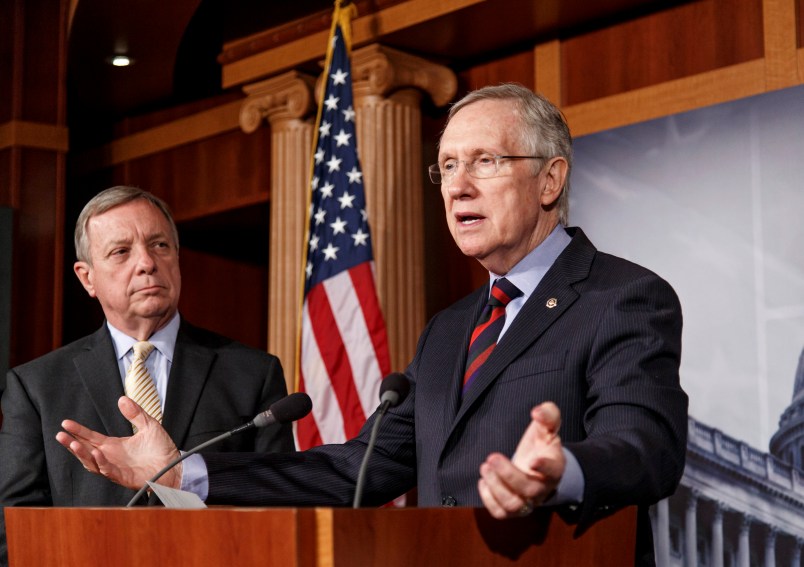The caterwauling from mainstream media punditry (as opposed to the insincere complaints of conservative voices who can barely disguise their eagerness to retaliate) about the new filibuster rules has already attracted some skillful and snarky rebuttals. But because it reflects so much faulty data and so many poor judgments and bad habits in political journalism, the mourning of the Senate of Yore needs to be buried quickly and decisively.
First of all, the old clubby Senate with its bipartisan friendships and compromises and its alleged taste for deliberation and civility was in many respects a graveyard for good as well as bad legislation, and frequently an impregnable fortress for reactionaries. Lest we forget, the filibuster along with the Senate’s strict seniority system were the instruments whereby a defeated Confederacy significantly mitigated its much-deserved losses for a century, to the moral and material impoverishment of the southern people and the perpetuation of America’s great damning injustice. Anyone singing dirges for the filibuster without acknowledging the millions of ghosts who cheer its every diminishment should be condemned to a careful reading of U.S. history.
Second of all, the replacement of ideological and regional polarization in and beyond the Senate by partisan polarization simply isn’t the seismic event it’s so often made out to be. That the conservative coalition which so often thwarted FDR, Truman and Kennedy (and on occasions Eisenhower and even Nixon) was composed of both Democrats and Republicans made it no less powerful or corrosive; indeed, ideological polarization across party lines tended to take major national challenges — most famously civil rights — off the table entirely. Now, at least, each party can effectively promote a conservative or liberal agenda on most major issues.
Third of all, the idea that a diminished (or even abolished) filibuster exposes political minorities to the furies of rampant temporary majorities ignores all the other checks and balances in the system. There is a Constitution policed by a lifetime judiciary. There are the staggered six-year terms of senators, which in turn significantly raise the probability of divided control of the federal government. And most of all, there’s the wildly anti-majoritarian basis of Senate representation, which happens at the moment to favor the party supposedly in danger of being overwhelmed by rampaging Senate Democrats. America is not in danger of becoming a parliamentary system, though political scientists increasingly agree that might be a benign development for the stability of our republic were it possible.
Fourth of all, today’s endless complaints about unhealthy partisanship invariably ignore the healthy and constructive aspects of partisan power. Presently, for example, the two major parties espouse diametrically opposed theories of economic growth and of government’s role in fostering it. Are compromises that incoherently mix their prescriptions — say, an expansive monetary policy combined with deflationary fiscal policies — really salutary or workable? And how are the two parties to be held accountable by voters if the status quo — the “track” which voters adjudge as “right” or “wrong” — cannot be fairly or clearly attributable to either? It’s true divided partisan control of Congress is a bigger culprit in this respect than the Senate filibuster, but when the ability to confirm nominations and pass significant legislation requires control of the House and the presidency and a super-majority in the Senate, then accountability for the conditions of the country will be an exceptionally rare event.
And that leads me to the fifth and most important factor affecting the argument over the unrestrained filibuster. Celebrants of bipartisanship err grievously in confusing “compromise” with gridlock based on the power to obstruct action in Congress. If America’s political genius is, as professional “centrists” sometimes insist, to foster the competition of conservative and liberal ideas and constituency groups operating dialectically like swings of a pendulum, the pendulum must be allowed to swing. Parties must be able to govern–succeeding, failing, adjusting, rethinking–before they can meaningfully be countered or restrained. A motionless pendulum halted by legislative obstruction means a dead mechanism: a feckless government, a directionless bureaucracy, and a democracy where voters express contempt for both parties and for government itself. Sound familiar?
It is sadly noteworthy that so many estimable public voices look at today’s political situation and see partisanship as the only real problem, and the messy “bipartisanship” of forced compromises and unstable government as the only solution. Thanks to the asymmetric polarization of the two parties characterized by a long ideological bender afflicting the Republican Party, such prescriptions inevitably mean a steady drift of the political system to the right. But even if we could somehow magically calibrate the “centrist” and “ideological” wings of the two parties to become congruent, is there any reason to believe the big choices faces the country on challenges ranging from access to affordable healthcare to rampant wealth inequality to a broken banking system can best be worked out behind closed doors by “gangs” cutting deals? I don’t think so. But then again, I often look back at the salad days of the “bipartisan” Senate and see not the genius of the Founding Fathers but men building monuments to themselves at public expense.
Ed Kilgore is the principal blogger for Washington Monthly’s Political Animal blog, Managing Editor of The Democratic Strategist, and a Senior Fellow at the Progressive Policy Institute. Earlier he worked for three governors and a U.S. Senator. He can be followed on Twitter at @ed_kilgore.






